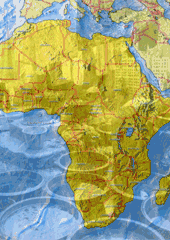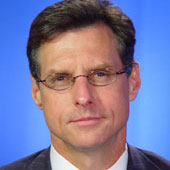The New Globalists: The Rise of Africa
What pulls an educated Zambia native home from New York?
August 24, 2013

Part five of a seven part series. Return to the beginning or part four.
The Transformers: Sarah’s Zambia
Next to New York City’s maddening traffic jams, nothing annoys Sarah more than the average American’s archaic view of Africa. She takes offense at the common narrative in the United States that Africa equates to conflict, poverty, the spread of AIDS, government corruption and other nefarious stereotypes of Africa.
Meet the Transformers
The Road Ahead
Coming of Age in a New China
Malling it in Moscow
The Rise of Africa
Baptized by Fire in Brazil
Dawn of the Internet in India
Yes, she will admit, the continent confronts significant structural challenges. And when pressed, Sarah admits that she decided to leave her native country for many of the reasons just cited.
But Sarah has seen a different Africa emerge over the past half decade and so have many other astute investors.
Unbeknownst to many, Africa is among the world’s fast-growing regions of the world, with real GDP growth in 2012 clocking in at 5.2% among countries of the Middle East and North Africa and 4.8% in Sub-Saharan Africa. That compares with a pitiful 1.3% rise in the developed nations.
More impressive than simple GDP figures are important metrics that point toward more sustainable growth in many parts of Africa. As recently noted in The Economist, secondary school enrollment in sub-Saharan Africa expanded by nearly 50% between 2000 and 2008.
Over the past decade, deaths due to malaria have declined by 30% in some of the worst affected countries. HIV-related deaths have plunged by 74%. Life expectancy across Africa has increased by around 10%.
Other key metrics cited by The Economist:
- Africa has three mobile phones for every four people, the same penetration as India.
- By 2017, nearly 30% of households are expected to have a television set, a near fivefold increase over 10 years.
- Nigeria produces more movies than America.
- While not even half of Africa’s nations are what the World Bank classifies as “middle income” at the moment, by 2025 most African states will have reached that stage.
In addition, between 2000 and 2010, per capita incomes across Africa rose 70%, among the fastest levels of growth in the world. In Sub-Saharan Africa, the population is expected to expand to 2.1 billion people by 2050 versus 900 million today.
According to the African Development Bank, the middle class is set to expand from 355 million people (its 2010 population, or 34% of Sub-Saharan Africa’s population) to 1.1 billion (42%) in 2060. In 1990, just over a quarter of the population was considered middle class.
Meanwhile, the continent’s population is relatively young, with Africa home to 17.5% of the world’s 15- to 24-year-olds. By 2050, this share is expected to be 31.3%. Presently, more than one-half of the population is under 24 years of age.
By 2050, Africa’s population of 2 billion will be larger than India’s and China’s.
Given all of the above, it is not surprising that Africa has finally emerged on the radar screens of many multinationals.
According to Jeff Immelt, Chairman and CEO of General Electric, Africa is now “essential” to the firm, as opposed to having been “off the radar” in the past. Albeit from a low base, the company hopes to double sales in Sub-Saharan Africa in the next few years.
GE is not alone in viewing Africa through a different lens. Wal-Mart now has about 300 stores in 14 African nations. Given rising beer consumption across the continent, more than a third of SABMiller’s group revenue comes from Africa — it accounts for roughly 60% of beer sold by volume in Africa. Meanwhile, Diageo, the owner of Guinness, sells more of the foamy brew in Nigeria than Ireland. Heineken’s largest brewer outside of Europe is in Nigeria.
Retail, banking and telecommunications multinationals are also in the mix thanks to Africa’s expanding technological capabilities, and the attendant innovation and connectivity that are sweeping the continent.
You get the picture: Once a commercial backwater, Africa is now a key source of natural resources and is emerging as a vast new consumer market for many Western multinationals.
The combination pushed foreign direct investment (FDI) inflows to a record $58 billion in 2008 before inflows tailed off in light of the global recession. Still, FDI inflows in 2011 — approximately $42.7 billion — were double the level of 2000 and 15 times larger than inflows in 1990.
In Zambia, Sarah’s home country, FDI inflows reached a record $2 billion in 2011.
Besides better economies, better politics are enticing more multinationals to sink capital in Africa. Typical day-to-day headlines in the U.S. speak to violence, ethnic conflicts and other political ills — of which there are many. But lost in the debate is the fact that Africa’s leaders and general population are better educated today than ever before.
They are also better connected, which has helped to increase the level of political accountability in many nations and helped to spawn more durable and trustworthy institutions.
Yes, the levels of corruption in some parts of Africa remain epic but, as Sarah is quick to remind anyone that will listen, change is coming.
Better government is becoming the norm. Technocrats — or folks educated in the West — are increasingly at the helm of many central banks across Africa or running key economic agencies.
And consumerism is taking hold, with personal consumption expenditures in Sub-Saharan Africa rising to a record $727 billion in 2011. That is more than triple the level of 2000.
For the entire continent, personal consumption expenditures topped $1 trillion for the first time in 2010, and rose another 8.1% in 2011, to reach a record $1.2 trillion.
The surge in consumption doesn’t surprise Sarah. Every time she travels back to her homeland, she sees more and more consumption among a more educated and hard-working middle class. This makes her excited and hopeful about the future prospects of not only Zambia but also Africa.
She loves New York but may end up back in Lusaka after her studies are complete.
Takeaways
Africa is growing fast, with real GDP growth in 2012 clocking in at 4.8% in Sub-Saharan Africa.
Secondary school enrollment in sub-Saharan Africa expanded by nearly 50% from 2000-2008.
Over the past decade, HIV-related deaths in Africa have plunged by 74%.
Nigeria's film industry produces more movies than the United States.
From 2000-2010, per capita incomes across Africa rose 70%.
Read previous

Iraq’s Oil Hopes
August 24, 2013



